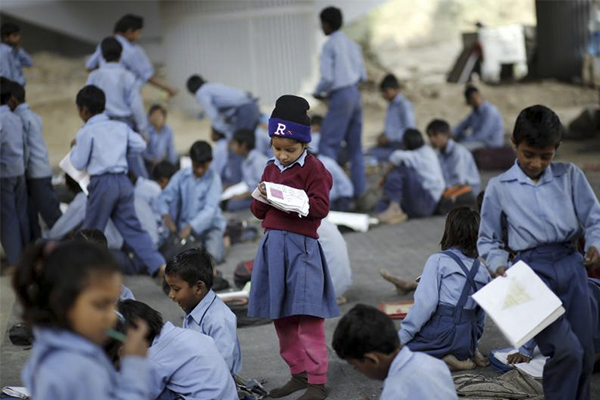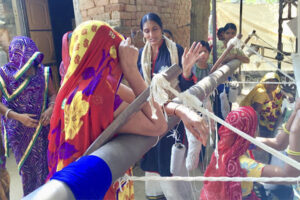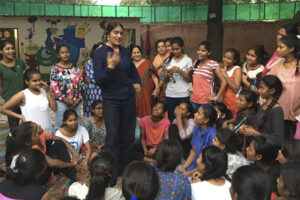THE PROBLEM:
After a gap of two years, schools have reopened. Watching children go back to school, meet their friends, share lunch and play together has been a moment to rejoice. But this is just one side of the fence.
The pandemic affected every child, but some suffered more than others. Children from socio-economically weaker sections, tribal belts, remote rural areas and urban slums, became the worst sufferers. When the schools were shut, only about 28% children living in rural areas and slums had access to digital learning. Education came to a halt for lakhs of children, who had already been struggling in the pre-pandemic world.
Despite all the odds, these young champions have not given up and continue to dream and work hard. With your support, we can fuel their dreams with accessible and quality education. Join hands with us to ensure a happy and safe childhood for all!
What is this Campaign about?
Access to education has always been a challenge for under-privileged children. However, due to the pandemic, as livelihoods were affected and many families were further pushed into poverty, lesser-privileged children suffered the most.
Schools were closed, education shifted online and economic vulnerability forced many children to compromise on their education and drop out of school to engage in menial labour. Thousands of children are missing from classrooms and have returned to work in factories, tea-stalls, sweatshops.
Out-of-school girls face early marriage, or worse. Boys are dropping out too sometimes, reversing all precedent, more than girls from the need to earn money and provide for the family. The International Labour Organization has predicted that with the pandemic, the world will witness a surge in child labour for the first time in 20 years, reversing years of progress.
The impact of the pandemic has been deep and long lasting. While privileged children could go back to school, under-privileged children have been struggling to get their lives back to normal. Coping with the expenses of the new online mode of learning has also posed as a challenge for many.
What we do:
A recent pan-India study by Smile Foundation with over 40,000 students from rural areas and urban slums found that 56% of children lacked access to a smartphone. Of these children, 12% had no access to any phone. Only 69% of students surveyed had access to television. Ground realities on access to e- education for children are stark.
The same challenges can also be seen in higher educational institutions.
During the pandemic, Only 34.1% cent of children had internet connection good enough for streaming real-time lectures.
But the digital divide is not the only challenge.
Studies show remote learning has a bearing on cognitive development. Wholesome cognitive development in children requires human interaction – teacher to student, student to teacher, and student to student.
As countries lockdown, learning outcomes are bound to get affected over the long-term. This being echoed by teachers and education facilitators in the news today, when they are being questioned on the efficacy of online classrooms. The feedback was quite unanimous. They claimed that there have been fewer engagement with students, debates and casual conversations which would lead to an energised learning environment are hard to create and now mostly non-existent, students ability to manage time was a challenge but the most pertinent on was the cutting off of a face to face contact.
Multiple studies have also illustrated the devastating effect of school closures on learning. NGOs from across the country have joined hands to conduct creative classes, run workshops on collaborative learning to ensure students are constantly engaged.
While the challenges of the times are plenty, how do we as a community come together and solve some of these issues? How do we ascertain that education which is a basic right for our youth is afforded to them? If we as a country are to grow, we need our foundations to be firm and the first step for that is education. And to achieve that, we all have to come together and solve for tomorrows problems today. The need of the hour is for government, corporates, NGOs and learning experts to come together to draft a detailed multi-modal learning strategy.
And we have the ability and intent.
What have we done to date?
The pandemic has provided a great opportunity for all stakeholders to get back on the drawing board and collectively address challenges in the effective delivery of education. This is the ideal time for educational institutions, NGOs and policymakers to realign strategies. What changes can we make to ensure that our students find the time and develop a routine to mentally engage in stress-free exercises thereby honing their skills and feel involved. As mentioned above, we have the ability, we have the innovations and we have the resilience all we need to do is make time. And that surely can be done by all of us for the future of our youth and in turn the future of our country.
Anu Aggarwal Foundation has partnered with other NGO’s such as Smile Foundation and other local foundations solely involved in educating underprevailaged children.
Where we are today?
From January 2020 to November 2022, we have served more than 1,000+ under prevaileged children. We are proud to share that we have serve in remote areas of Mumbai such as Dharavi (Asia’s largest slum), Mahim, eastern Mumbai and Malwani etc.
About Organization:
Anu Aggarwal Foundation is a Mumbai based NGO, focused on distributing nutritious food to the poor and needy along with clothes, education for children, skill development amongst women and basic necessities support across the country. The aim of this campaign is “Eliminate Hunger in India” in a nation where the rich-poor divides are stark and while a million splurges on good food, we find it unacceptable that even bigger millions of people have to go to bed hungry without any means for food of nutrition.
What is our goal?
Our Goal is to feed over 10,000 children throughout Mumbai and Delhi. To reach our goal we have to raise approximately ₹17,50,000. Our cost for education per child per month comes upto ₹1750/- only.
What do we need from you?
We request you to support our cause with any contribution to manage our operations and do better for the world. Connecting CSR support would be the best way to help us in a long way.
Organizations details
Anu Aggarwal Foundation




